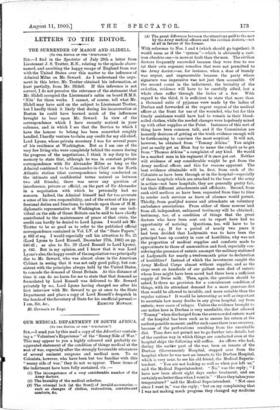LETTERS TO THE EDITOR.
THE SURRENDER OF MASON AND SLIDELL.
[TO TEl .EDITOR OP THE "SPECTATOR.")
Srn,—I find in the Spectator of July 28th a letter from Lieutenant J. S. Trotter, R.N., relating to the episode above- named, and ascribing the happy escape of England from war with the United States over this matter to the influence of Admiral Milne on Mr. Seward. As I understand the argu- ment in this letter, Mr. Trotter obtained his information, at least partially, from Mr. Slidell. If this inference is not correct, I do not perceive the relevance of the statement that Mr. Slidell occupied the Lieutenant's cabin on beard H.M.S. 'Nile' for, three weeks. I cannot, of course, tell what Mr. Slidell may have said on the subject to Lieutenant Trotter, but I hardly think it likely that during his incarceration at Boston he could have learned much of the influences brought to bear upon Mr. Seward. In view of the correspondence which I have recently noticed in your columns, and in which I see that the Service to which I have the honour to belong has been somewhat roughly handled, I hardly venture to claim any credit for my old chief, Lord Lyons, whose private secretary I was for several years of his residence at Washington. But as I am one of the very few living who were completely behind the scenes during the progress of the negotiations, I think it my duty to his memory to state that, although he was in constant private correspondence with Sir Alexander Milne as long as the Admiral continued to be Commander-in-Chief on the North Atlantic station (that correspondence being conducted on the intimate and confidential terms natural as between two old friends), there was never any question of interference, private or official, on the part of Sir Alexander in a negotiation with which he personally had no concern. Indeed, the Admiral himself had far too accurate a sense of his own responsibility, and of the extent of his pro- fessional duties and functions, to intrude upon those of H.M. diplomatic representative at Washington. If any one indi- vidual on the side of Great Britain can be said to have chiefly contributed to the maintenance of peace at that crisis, the credit can hardly be denied to Lord Lyons. I would ask Mr. Trotter to be so good as to refer to the published official correspondence contained in Vol. LV. of the "State Papers,"
p. 602 et seg. I would especially call his attention to No. 25 (Lord Lyons to Lord Russell, December 27th, 1862) on pp. 640-41; as also to No. 29 (Lord Russell to Lord Lyons),
p. 645. But in my opinion, and I know that it was Lord Lyons's also, the happy result of the negotiation was principally due to Mr. Seward, who was almost alone in the American Cabinet in seeing that it was not only good policy, but con- sistent with the principles always held by the United States, to concede the demand of Great Britain. At this distance of time it can do no harm for me to state that that demand as formulated by Lord Russell was delivered to Mr. Seward privately by me, Lord Lyons having charged me after his first interview with Mr. Seward to go at once to the State Department and place a copy of Lord Russell's despatch in the hands of the Secretary of State for his unofficial perusal.—


































 Previous page
Previous page